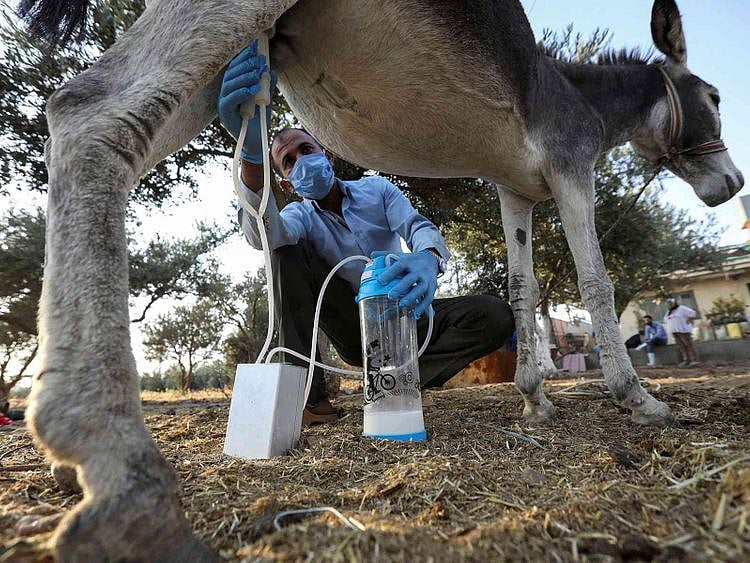Demand soars for donkey milk soap in Jordan
Family-owned project 'Atan Donkey Milk Soap' was first mocked; 4,500 bars sold each month

Also In This Package
Dubai: Jordanian customers are increasingly eager to buy chemical-free donkey milk soap manufactured in a first-of-its-kind project in the region, local media said.
Jordanians mocked the family-owned venture making soap from Atan donkey milk, when the product was first announced. Now, a year on, the customers can't have enough.
The growing public demand for the soap is due to expectations that the product brings a magic solution to skin problems. Each litre of donkey milk can be used to produce of 30 bars of soap after mixing it with olive oil, almond oil, coconut oil and shea butter.
The company, Atan Donkey Milk Soap, produces 100 per cent natural soaps from its farm in Madaba, 35 km southwest of Amman, where it keeps 12 donkeys. The company has a small manufacturing workshop in the Jordanian capital Amman.
“At the beginning, many people mocked the idea,” said Emad Attiyat, 32, co-founder of the project, whose name derived from the Arabic word “Atan” for a jenny or female donkey. Attiya co-founded the project with his mother, Salma Al Zubi, 60, the brainchild behind the soap.
Attiyat who has a degree in Management Information Systems, said: “Many people laughed at us when we announced the project, saying there is nothing left except the donkey to milk it. Some said it is absolutely crazy to put something related to donkeys on my body.”
Standing next to the barn where the donkeys are housed, Attiyat said: “We distributed 160 bars of soap for free to encourage people to try it first. After trying the soap, they changed their idea. And now, we produce more than 4,500 bars of soap per month to meet the growing demand.”
Donkey’s milk is said to be rich in minerals and proteins that can help moisturise the skin. It also has high levels of antioxidants, which protect the skin from sunlight and the effects of ageing, according to beauticians.
Milking donkeys
One litre of milk produces around 30 bars of soap, but milking each female donkey is a painstaking task done with the help of a hand-held electronic pump.
Each donkey has to be milked three times a day in order to get about one litre of milk, and leaving about another litre for its foal. The milk is frozen and then transferred to the company’s workshop in Amman to be turned into soap.
Research show donkey milk can “help regenerate skin cells, reduce signs of ageing and help cure some skin diseases such as eczema,” Al Zubi, an environmental activists and retired teacher, said.
She added that donkey’s milk soap contributes to balancing the skin’s moisture levels, removing wrinkles as well as the effects of spots and acne.
Olive oil, almond oil, coconut oil as well as shea butter are added to the donkey milk to produce the soap which is sold via their Facebook page. They sell a small bar of soap for eight Jordanian dinars ($11), while the large one is sold for 10 dinars ($14).
With the growing demand for the product, the family is thinking of expanding production to include face and hand creams and body lotions. Al Zubi said: “The project contributed to creating jobs for unemployed family members.”
Dietician Susanna Haddad, who works at a beauty centre in Amman, said: “Donkey’s milk is rich in proteins and minerals including magnesium, copper, sodium, manganese, zinc, calcium and iron, all of which are very important for the skin.”
It also contains “higher percentages of whey, which has antimicrobial properties” and can prevent the growth of viruses and bacteria, Haddad added.
Dietitians sa that donkey milk contains plenty of vitamins A, B1, B2, C and E, high levels of magnesium, calcium, potassium, phosphorus, zinc and sodium.
Sign up for the Daily Briefing
Get the latest news and updates straight to your inbox
Network Links
GN StoreDownload our app
© Al Nisr Publishing LLC 2026. All rights reserved.